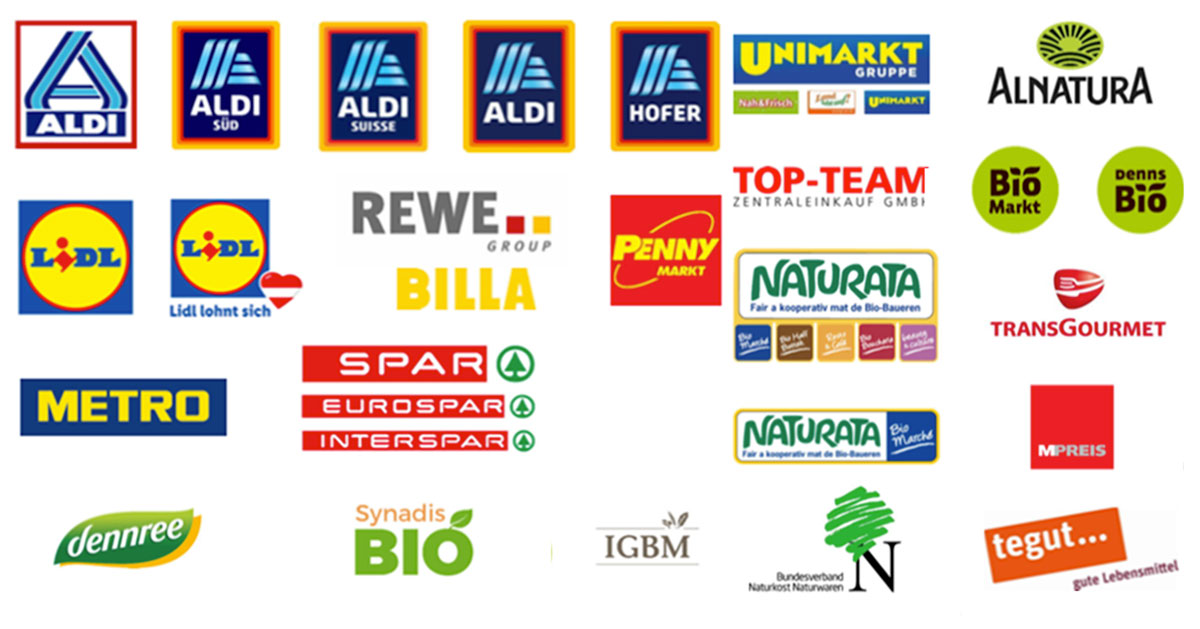
The "Retailers' Resolution against Deregulating New GMOs" demands protection for "Non-GMO“ and organic products. All GMOs on plates and fields should remain strictly regulated in the EU; the precautionary principle and labelling must not be undermined
In a statement published today, "Retailers' Resolution: European retailers take a strong stand against deregulating new GMOs", leading companies of the European food retail sector, among them major international brands as well as numerous national and organic retailers, demand that the proven-effective regulation of GMOs on the European market be maintained. This applies to products of "old genetic engineering" (primarily soy, maize, rapeseed) as well as to those produced with "new genetic engineering" methods such as CRISPR or TALEN.
“As representatives of key European retailers we insist that the existing EU GMO legislation – with the precautionary principle and transparency requirements as its central pillars – continue to be applied to new GMOs. New GMOs must continue to be regulated in the same manner as old GMOs,” is one of the key demands of the resolution, which also refers to the corresponding ruling of the European Court of Justice of 25 July 2018.
The food retailers express their great concern that the EU Commission might give in to years of massive pressure from the biotech and seed lobby and immediately initiate deregulation for some or all new genetic engineering techniques. With the publication of the EU Commission's stakeholder consultation on 29 April 2021, such a deregulation – and thus an opening of the European market for untested and invisible new GMOs – is moving into the realms of possibility.
Heike Moldenhauer, Secretary General of ENGA AISBL, the European Non-GMO Industry Association, said, "The EU Commission is seriously considering abolishing the current comprehensive risk assessment and labelling for 95 percent of all GMOs produced with new genetic engineering. In doing so, the Commission is undermining the precautionary principle and freedom of choice, two fundamental principles of the European Union. And it is putting at risk what is a matter of course under the current legal situation: GMO-free production and nutrition. We therefore call on the EU Commission to abandon its course of deregulation for new GMOs and to continue to guarantee approval procedures, traceability, labelling and thus transparency for consumers and the food sector.”
Europe-wide booming "Non-GMO" production and organic products in danger
In Germany, "Non-GMO" and organic products now each generate double-digit billions in sales, with strong growth year after year. The share of products with the corresponding quality labels in food sales is growing. The situation is similar in other EU countries. This future markets would be threatened by deregulation. "New GMOs must continue to be regulated in the same manner as old GMOs. Any other outcome from the political and scientific discussions currently underway would seriously undermine our own businesses, as well as the businesses of many farmers and seed, feed and food producers, especially in the highly-successful organic sector”, the Retailers' Resolution states.
Deregulation would make transparency and traceability impossible
If deregulation were to take place, products from new genetic engineering processes would be put on the market without risk assessment, untested and without labelling. The "Non-GMO" label, which has been established for many years and is appreciated by consumers, must keep its promise, i.e. it must reliably exclude new GMOs as well as "old" ones. This is only possible with binding GMO approval procedures and labelling along the entire value chain.
Green Deal and deregulation of new GMOs are incompatible
The organic sector would also be massively affected by a deregulation of new GMOs: The exclusion of any use of genetic engineering is explicitly anchored in the EU regulation on organic farming – as an important selling point for organic products. It would not only be the European organic sector itself that would be at risk: the expansion of organic farming in Europe to 25 percent by 2030, as envisaged in the EU Commission's ambitious Green Deal, would also be at stake. In general, GMO deregulation is incompatible with the Green Deal and the strengthening of the EU food system towards resilience and sustainability, write the food retailers.
Food retailers have a responsibility to their customers
The risk of unintentionally and unknowingly selling untested and unlabelled GMOs from new genetic engineering methods is unacceptable to the food retailers. They say, "As retailers, we are fully responsible and liable for the safety of all the products we sell," adding, "full transparency and freedom of choice for our customers is one of our key values." And customers have clear wishes: "As retailers we must be highly sensitive to the social, behavioural and food-related patterns of our customers: Throughout Europe reports show that a substantial majority of consumers have no demand whatsoever for GMOs in their food.”